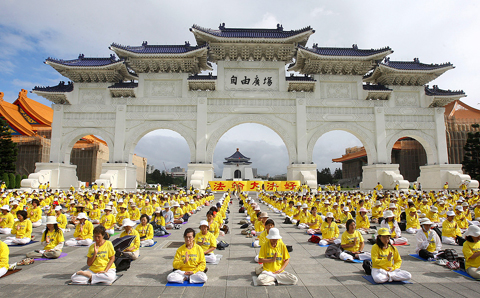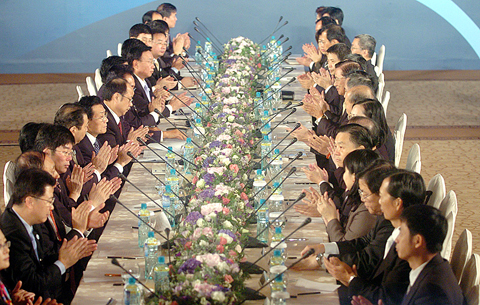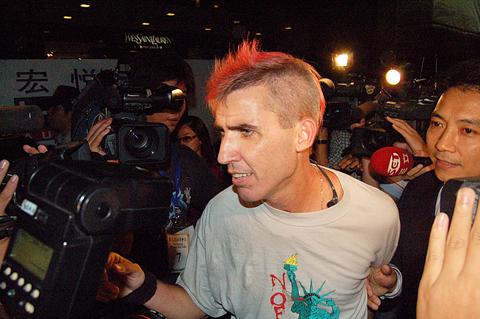Taipei and Beijing inked four agreements yesterday, agreeing to drastically expand flights and allow shipping links across the Taiwan Strait. The four pacts addressed direct sea links, daily charter flights, direct postal service and food safety.
While the agreement on food safety will take effect within seven days, the other three will be implemented after 40 days.
The agreements on food safety and direct postal services must be ratified by the legislature, while the deals on direct air and shipping links need only a legislative review to take effect.

PHOTO: CNA
CHAMPAGNE AND SMILES
After signing the pact, Straits Exchange Foundation (SEF) Chairman Chiang Pin-kung (江丙坤) and his Chinese counterpart, Association for Relations Across the Taiwan Strait (ARATS) Chairman Chen Yunlin (陳雲林), smiled and shook hands with each other. They sipped champagne and held up two lines of framed calligraphy that said: “Peaceful negotiation creates a win-win situation.”
In his opening speech to the meeting, Chiang said that at their first talks in Beijing in June, he had a hard time even getting close enough to shake Chen’s hand, but “this time around, the distance between us is so little.”

PHOTO: CHANG CHIA-MING, TAIPEI TIMES
“It shows that the distance between both sides, both tangibly and symbolically, is much closer,” he said.
Emphasizing that the people of Taiwan and China are “compatriots of the same bone and blood,” Chen said yesterday’s talks between “the leaders of both sides” were the first since the establishment of the two cross-strait agencies in 1991.
Through their joint efforts, direct transportation links and direct postal services will soon become a reality, he said.

PHOTO: WU YUE-HSIU, TAIPEI TIMES
NEXT TIME AROUND
The SEF and ARATS also reached a consensus on a list of issues to discuss at the next round of talks: cooperation on law enforcement; financial cooperation, such as allowing banks to set up cross-strait branches; financial supervision of stocks, futures and banking; cooperation on investment; industrial partnership; cooperation on fishing matters; cultural and educational cooperation; and pursuing further exchanges between the two agencies.
Chiang and Chen also discussed the progress made on two agreements signed during the last SEF-ARATS meeting to launch weekend charter flights and increase the quota for Chinese tourists visiting Taiwan to 3,000 per day.
ARATS proposed lowering the minimum threshold for Chinese tourist groups from 10 people to five and increasing the maximum permissible length of stay from 10 days to 15 days.
SEF Secretary-General Kao Koong-lian (高孔廉) said yesterday’s meeting did not touch on political issues.
WHEN AND WHERE
The next meeting between Chiang and Chen is likely to take place in the spring or summer, with Chen extending an invitation yesterday for Chiang to visit Beijing next year. Among the priorities for the next meeting between the agencies is investment protection for Taiwanese businesspeople in China, Chiang said.
Kao said he was optimistic that both sides would ink a memorandum of understanding at next year’s meeting on financial matters.
PUBLIC INTEREST
At the press conference after the meeting, Chiang told reporters he was confident the four agreements would obtain the backing of the legislature and be implemented on schedule because they serve the public interest.
Regarding establishing a liaison office on the other side, Mainland Affairs Council (MAC) Deputy Chairman Fu Don-cheng (傅棟成) said the two sides agreed at the first round of talks to do so six months after the June agreements were signed, and that preparatory offices had been set up.
At a separate press conference held by ARATS, ARATS Vice Chairman Zhang Lizhong (鄭立中) said that with the new agreements now signed, Chen expected the two sides to gradually develop economic cooperation, while strengthening cultural and educational exchanges in the near future.
Zhang declined to say whether direct routes between China and Taiwan would be considered domestic or international but said the two sides would make every effort to open more direct flights as soon as possible.
While a food safety accord was among the agreements signed yesterday, Zhang touched only briefly on China’s opposition to Taiwan’s attempts to join the WHO.
“We understand the reaction of the Taiwanese people on this issue ... We agreed to discuss Taiwan’s participation at the WHO as a priority issue and I believe that we will find a solution to this problem,” he said, declining to elaborate.
Concerning the protests against Chen’s visit this week, Zhang said that the majority of Taiwanese welcomed the cross-strait talks and he suggested that independence supporters visit China.
“We welcome them to visit China and gain a better understanding of China. Their misconceptions of China will dissolve and I believe they will instead support us in the end,” he said.
Chen spent yesterday afternoon conducting private visits. He paid tribute to late Formosa Plastics Corp founder Wang Yung-ching (王永慶) at a funeral hall.
Saying he had been friends with Wang for 15 years, Chen said Wang had often spoken of the importance of direct cross-strait transportation links. Chen said he was happy that Wang’s dream had finally come true.
Chen also met MAC Chairwoman Lai Shin-yuan (賴幸媛) at the Grand Formosa Regent Hotel, during which Chen addressed Lai as “the main person responsible for mainland affairs in Taiwan.”
Lai later told reporters that one’s status does not depend on how others address one and that Chen had not disparage her status as MAC chairwoman.
Chen ended yesterday with a dinner with former Chinese Nationalist Party (KMT) chairman Lien Chan (連戰) at the Ambassador Hotel.
ADDITIONAL REPORTING BY JENNY W. HSU AND AGENCIES
Also See: Lien lauds ‘historic visit’ amid pro-Taiwan fervor、 THE LIBERTY TIMES EDITORIAL: One nation loses in talks: Taiwan

CHAOS: Iranians took to the streets playing celebratory music after reports of Khamenei’s death on Saturday, while mourners also gathered in Tehran yesterday Iranian Supreme Leader Ayatollah Ali Khamenei was killed in a major attack on Iran launched by Israel and the US, throwing the future of the Islamic republic into doubt and raising the risk of regional instability. Iranian state television and the state-run IRNA news agency announced the 86-year-old’s death early yesterday. US President Donald Trump said it gave Iranians their “greatest chance” to “take back” their country. The announcements came after a joint US and Israeli aerial bombardment that targeted Iranian military and governmental sites. Trump said the “heavy and pinpoint bombing” would continue through the week or as long

TRUST: The KMT said it respected the US’ timing and considerations, and hoped it would continue to honor its commitments to helping Taiwan bolster its defenses and deterrence US President Donald Trump is delaying a multibillion-dollar arms sale to Taiwan to ensure his visit to Beijing is successful, a New York Times report said. The weapons sales package has stalled in the US Department of State, the report said, citing US officials it did not identify. The White House has told agencies not to push forward ahead of Trump’s meeting with Chinese President Xi Jinping (習近平), it said. The two last month held a phone call to discuss trade and geopolitical flashpoints ahead of the summit. Xi raised the Taiwan issue and urged the US to handle arms sales to

BIG SPENDERS: Foreign investors bought the most Taiwan equities since 2005, signaling confidence that an AI boom would continue to benefit chipmakers Taiwan Semiconductor Manufacturing Co’s (TSMC, 台積電) market capitalization swelled to US$2 trillion for the first time following a 4.25 percent rally in its American depositary receipts (ADR) overnight, putting the world’s biggest contract chipmaker sixth on the list of the world’s biggest companies by market capitalization, just behind Amazon.com Inc. The site CompaniesMarketcap.com ranked TSMC ahead of Saudi Aramco and Meta Platforms Inc. The Taiwanese company’s ADRs on Tuesday surged to US$385.75 on the New York Stock Exchange, as strong demand for artificial intelligence (AI) applications led to chip supply constraints and boost revenue growth to record-breaking levels. Each TSMC ADR represents

State-run CPC Corp, Taiwan (CPC, 台灣中油) yesterday said that it had confirmed on Saturday night with its liquefied natural gas (LNG) and crude oil suppliers that shipments are proceeding as scheduled and that domestic supplies remain unaffected. The CPC yesterday announced the gasoline and diesel prices will rise by NT$0.2 and NT$0.4 per liter, respectively, starting Monday, citing Middle East tensions and blizzards in the eastern United States. CPC also iterated it has been reducing the proportion of crude oil imports from the Middle East and diversifying its supply sources in the past few years in response to geopolitical risks, expanding